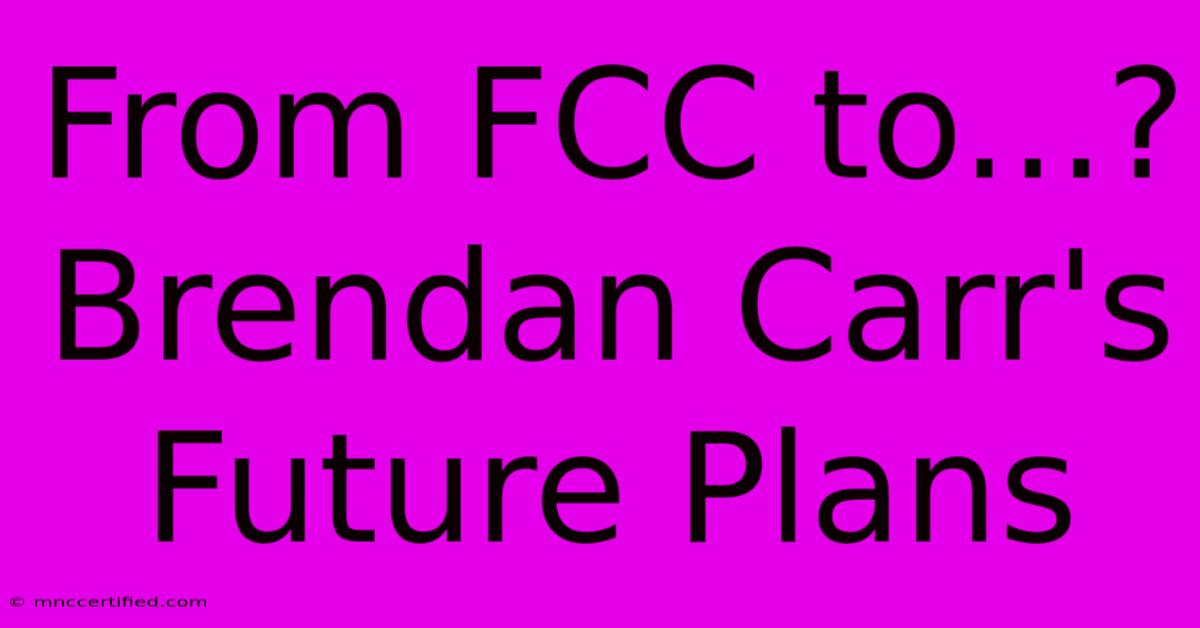From FCC To...? Brendan Carr's Future Plans

Table of Contents
From FCC to...? Brendan Carr's Future Plans: What's Next for the Controversial Commissioner?
Brendan Carr's tenure as an FCC Commissioner was marked by significant policy clashes and outspoken stances on issues ranging from net neutrality to Chinese telecommunications companies. His departure from the Federal Communications Commission leaves many wondering: what's next for this controversial yet influential figure? This article delves into Carr's potential future plans, exploring his likely career trajectories, considering his past actions and public statements.
A Legacy of Controversy and Influence
Carr's time at the FCC was far from uneventful. He consistently championed a more deregulatory approach, frequently clashing with Democratic Commissioners. Key moments that defined his legacy include:
- Net Neutrality Rollback: Carr played a pivotal role in the Trump administration's repeal of net neutrality rules, a decision that sparked widespread protests and legal challenges. This action solidified his reputation as a proponent of lighter government regulation in the telecommunications sector.
- TikTok Crackdown: His vocal opposition to TikTok, citing national security concerns, led to calls for a ban on the popular video-sharing app in the United States. This aggressive stance showcased his hardline approach towards Chinese technology companies.
- Starlink and Satellite Internet: While critical of certain aspects of the telecommunications industry, Carr also championed the expansion of satellite internet access, expressing support for initiatives like SpaceX's Starlink. This highlights a nuanced perspective that focuses on competition and innovation, even within a framework of cautious regulation.
Potential Future Endeavors: Where Will Carr Go Next?
Given his background in law and his extensive experience in telecommunications policy, several paths lie ahead for Brendan Carr:
1. The Private Sector: A Lucrative Opportunity?
The private sector offers lucrative opportunities for individuals with Carr's expertise. He could potentially join a major telecommunications company in a senior advisory or leadership role, leveraging his deep understanding of FCC regulations and policy. Alternatively, he might find a position in a lobbying firm, representing clients navigating the complexities of telecommunications law. This path offers significant financial rewards but could also raise concerns about potential conflicts of interest.
2. Academia: Shaping the Next Generation of Policymakers
A transition to academia would allow Carr to share his insights and experience with future generations of policymakers and telecommunications experts. He could pursue a teaching position at a prestigious university, contributing to the curriculum and shaping the discourse around telecommunications policy. This option aligns with his stated commitment to fostering a competitive and innovative telecommunications landscape.
3. Think Tanks and Public Policy Organizations: Continuing the Debate
Think tanks and public policy organizations offer a platform for continued engagement in the policy debate. Carr could join an organization aligned with his conservative viewpoints, contributing to research, publications, and public commentary. This option would allow him to maintain a strong voice in shaping future telecommunications policy, potentially influencing future regulatory decisions.
4. Government Service: A Return to Public Life?
While less likely immediately following his time at the FCC, a return to government service in a different capacity is not entirely out of the question. Depending on political landscapes and future administrations, a role within another agency or potentially even a return to the FCC under a different political leadership remains a remote possibility. This is a scenario heavily influenced by future political developments.
Conclusion: An Uncertain Future, a Lasting Impact
Brendan Carr's future remains uncertain. However, his time at the FCC has undeniably left a lasting impact on the telecommunications landscape. Regardless of the path he chooses, his views on deregulation, national security concerns related to technology, and the future of broadband access will continue to shape the ongoing debate around these crucial issues. His next steps will be closely watched by both supporters and critics alike.

Thank you for visiting our website wich cover about From FCC To...? Brendan Carr's Future Plans. We hope the information provided has been useful to you. Feel free to contact us if you have any questions or need further assistance. See you next time and dont miss to bookmark.
Featured Posts
-
Croatia Vs Portugal Uefa Nations Live Stream
Nov 19, 2024
-
Seahawks Host Food Drive Nov 24th
Nov 19, 2024
-
Thanksgiving In Cny 2024 Events
Nov 19, 2024
-
Huda Beauty Sale Black Friday 2024
Nov 19, 2024
-
Russias Response To Bidens Missile Plan
Nov 19, 2024